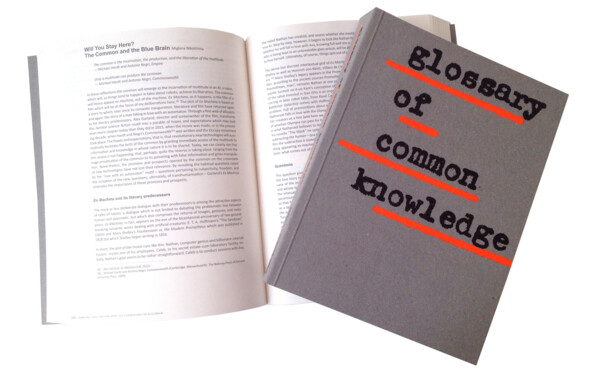The Glossary of Common Knowledge (GCK) is a compilation of art terminology that differs substantially from what is found in the existing literature on art. First, it was a five-year research project by Moderna galerija (MG+MSUM) in the frame of L’Internationale confederation, continued by a four-year research project conducted by the same confederation. In collaboration with institutions and individuals from Europe and other parts of the world, over 100 contributors/narrators proposed terms relating to their own practices and contexts, to historical references, political or social situations or L’Internationale projects. The terms were discussed and defined on six referential fields (Historicisation, Subjectivisation, Geopolitics I, Geopolitics II, Constituencies, Commons, and Other Institutionality). The first volume of terms was published in a book in 2018 and the second volume is planed to be published in 2022. The book follows these referential fields in six chapters.
Narrators created a plurality of voices and narratives which examine the proposed terms and add their different viewpoints, bringing with them overlooked, suppressed knowledge and also non-Western categories of thought and memories. This method enabled different ways of participation, sharing and using the knowledge and working together trans-globally.
The first volume of the Glossary of Common Knowledge published in 2018 contains 86 terms proposed by 66 contributors: Nick Aikens, Azra Akšamija, Burak Arıkan, Marwa Arsanios, Zdenka Badovinac, Sezgin Boynik, Boris Buden, Zoe Butt, John Byrne, Jesús Carrillo, Colin Chinnery, Keti Chukhrov, Anyely Marín Cisneros, Rebecca Close, Lia Colombino, Bart De Baere, Carlos Prieto del Campo, Marta Malo de Molina, Ekaterina Degot, Galit Eilat, Róza El-Hassan, Patrick D. Flores, Kate Fowle, Cristina Freire, Anthony Gardner, Chema González, Alenka Gregorič, Dušan Grlja, Khwezi Gule, Aigul Hakimova, Vít Havránek, Beatriz Herráez, Ida Hiršenfelder, Marianna Hovhannisyan, Manray Hsu, Marko Jenko, Anej Korsika, Vasıf Kortun, Anders Kreuger, Lisette Lagnado, Thomas Lange, Miguel A. López, Manos Invisibles, Sohrab Mohebbi, Gabi Ngcobo, Miglena Nikolchina, Ahmet Öğüt, Meriç Öner, November Paynter, Alexei Penzin, Jabulani Chen Pereira, Bojana Piškur, Paul B. Preciado, Tzortzis Rallis, pantxo ramas, Suely Rolnik, Rasha Salti, Raúl Sánchez Cedillo, Aida Sánchez de Serdio Martín, Ania Szremski, Igor Španjol, Mabel Tapia, Francisco Godoy Vega, Jelena Vesić, Stephen Wright, Darij Zadnikar, Adela Železnik
Glossary of Common Knowledge was curated by Zdenka Badovinac Bojana Piškur and Jesús Carrillo. The book edited by Ida Hiršenfelder, and published by Moderna galerija. ISBN 978-961-206-132-6

The second volume of the Glossary of Common Knowledge, Vol. 2, published in 2022 contains 57 terms proposed by 51 contributors: Zdenka Badovinac, María Berríos, Miha Blažič (N’toko), Sara Buraya Boned, Jesús Carrillo, Sebastian Cichocki, Fatma Çolakoğlu, Nicolás Cuello, Jakub Depczyński, Kike España, Pauliina Feodoroff, Maddalena Fragnito, Elisa Fuenzalida, Nancy Garín Guzmán, Deniz Gül, Jennifer Hayashida, Ida Hiršenfelder, Alistair Hudson, Maria Iñigo Clavo, Goran Injac, Vladan Joler, Yuji Kawasima, Gal Kirn, Ram Krishna Ranjan, Vali Mahlouji, Sophie Mak-Schram, Javiera Manzi A., Diego Marchante “Genderhacker”, Pablo Martínez, Miran Mohar, Meriç Öner, Bojana Piškur, Theo Prodromidis, Tjaša Pureber, Rasha Salti, Anja Isabel Schneider, Natalia Sielewicz, Antoine Silvestre, Maja Smrekar, Jonas Staal, Bogna Stefańska, Kuba Szreder, Steven ten Thije, Abhijan Toto, Fran MM Cabeza de Vaca, Chương-Đài Võ, Mick Wilson, Onur Yıldız, Joanna Zielińska, Yolande Zola Zoli van der Heide, Joanna Zielińska
Glossary of Common Knowledge, Vol. 2 was curated by Zdenka Badovinac, Ida Hiršenfelder, Bojana Piškur and Jesús Carrillo. The book edited by Ida Hiršenfelder, and published by Moderna galerija. ISBN 978-961-206-153-1



